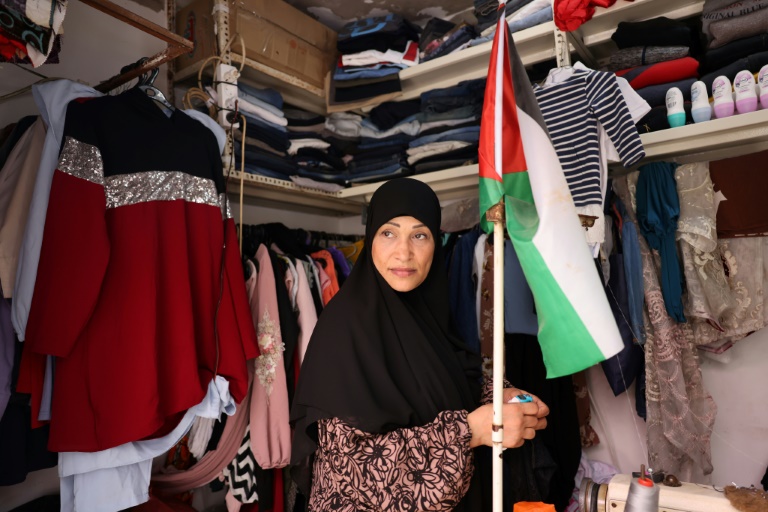Joy in Palestinian refugee camp in Beirut as European trio advances cause

A shop owner carries a Palestinian flag in her store in the Shatila refugee camp in Beirut
Shatila – In Beirut’s impoverished Palestinian refugee camp of Shatila — a maze of alleyways where posters honour fallen martyrs — residents expressed joy Wednesday after three European countries said they would recognise a Palestinian state.
“We hope that the whole world will recognise Palestine, and we are happy with this decision… It is a beautiful feeling,” said Alaa Ghozlan, 26, whose family is originally from Haifa, now in northern Israel.
“We now have hope to return to our country — a country I was not born in and was deprived of but which lives inside me despite everything,” he told AFP on a winding street in the camp.
Israel was enraged by the move announced Wednesday by Ireland, Norway and Spain, arguing that it amounts to “rewarding terrorism” after Palestinian militant group Hamas launched its unprecedented October 7 attack on Israel that sparked the bloodiest ever Gaza war.
Seven other European countries including Sweden have already recognised Palestinian statehood.
Lebanon hosts an estimated 250,000 Palestinian refugees, many living in poverty in the country’s 12 official camps, according to the United Nations agency for Palestinian refugees (UNRWA).
Most are descendants of survivors of what Palestinians call the Nakba — the “catastrophe” — when about 760,000 Palestinians fled or were forced from their homes by the 1948 war over Israel’s creation.
– ‘Demand our rights’ –
Shatila resident Samah Omari, 50, a housewife, said she was “very happy” with the decision, and expressed hope that it would eventually impact her and her family.
“People are dying in Palestine. We demand our rights and defend our land so that our state can be recognised by all countries,” she said.
“We hope to return to our country and not be refugees anymore,” she added.
The camp’s tumbledown walls are adorned with Palestinian flags and posters in support of militant groups including Hamas and their leaders.
Men on motorbikes and tuk-tuks squeeze past women shopping and schoolchildren making their way through the streets.
Above, matted electricity wires and plastic water tubes are bound precariously with rope or cables, some weighed down by clothes that have fallen from washing lines.
The United States and most Western European nations have said they are willing to one day recognise Palestinian statehood, but not before agreement is reached on thorny issues like final borders and the status of Jerusalem.
But Israel’s war against Hamas militants in Gaza, with its mounting death toll, has given the issue new impetus.
– ‘Bright future’ –
Suliman Abdel Hadi, 70, an official at the camp, said the timing of the decision was “important after October 7 because of the massacres carried out by the brutal Zionist enemy”.
“We see a bright future for the Palestinian cause,” said Abdel Hadi, whose family is from the Acre area, now in northern Israel.
“What happened today is the result of sacrifices made by the Palestinian people over 76 years of persecution, killing and destruction,” he added.
Hamas’s October 7 attack resulted in the deaths of more than 1,170 people, mostly civilians, according to an AFP tally of Israeli official figures.
Militants also took 252 hostages, 124 of whom remain in Gaza, including 37 the army says are dead.
Israel’s retaliatory offensive has killed at least 35,709 people in Gaza, most of them civilians, according to the Hamas-run territory’s health ministry.
On another street in Shatila, a man who gave his name as Abu Majdi, and whose father originally hailed from Haifa, called the decision “great” and said it was “baptised in the blood of martyrs”.
“This recognition will change the future of coming generations and the future of the Palestinian cause,” said the 63-year-old man, a Palestine pendant hanging from his neck.
